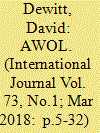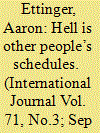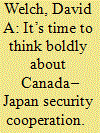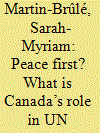|
|
|
Sort Order |
|
|
|
Items / Page
|
|
|
|
|
|
|
| Srl | Item |
| 1 |
ID:
159847


|
|
|
|
|
| Summary/Abstract |
Our focus is on Canadian defence and security activities in the Asia Pacific arena between 1990 and 2015. While governments have asserted the growing primacy of the Asia Pacific, we ask the following: What does Canada’s recent military and security record tell us about the policies and operational aspects of Canadian engagement? How might we assess these in comparison with Ottawa’s declared importance of the Asia Pacific? What might this tell us about the near-term future of Canada’s role and pursuit of interests and opportunities in this complex region? We present and analyze empirical materials drawn from primary sources that inform an assessment of Canada’s presence in the defence and security agenda of the Asia Pacific, during the period that saw Canadian governments declare a deep interest in relations with the Asia Pacific, yet fail to make Canada a full partner with sustained commitments.
|
|
|
|
|
|
|
|
|
|
|
|
|
|
|
|
| 2 |
ID:
147847


|
|
|
|
|
| Summary/Abstract |
Since 2001, Canada has participated in multilateral security operations in Afghanistan and Libya, and as part of the anti-ISIS coalition. Canada’s contributions have been the sum of eleven distinct time-delimited missions ranging from six months to four years. Until now, this variation in strategic duration has drawn little scholarly attention. This paper investigates the logic underpinning Canada’s variable mission commitments. We find that the actions of specific allies, as well as the NATO alliance as a whole, can account for the particular duration of Canadian military commitments. External pressure, combined with Canada’s internationalist orientation, reputational concerns, and the relative weakness of Canada’s Parliament, contributes to a cycle of engagement and re-engagement whereby extrication is perceived to come with high costs in reputation. This creates a dilemma for Canadian governments: participate in multilateral operations and be seen as a good ally, but cede control over strategic duration to forces beyond your control; or, don’t participate and risk that standing.
|
|
|
|
|
|
|
|
|
|
|
|
|
|
|
|
| 3 |
ID:
169206


|
|
|
|
|
| Summary/Abstract |
Policy-makers, scholars, and commentators regularly remark upon the unrealized potential of Canada–Japan cooperation, but neither country has taken decisive steps to address it. This reticence is especially noticeable in the security realm. As friendly, like-minded countries with common values, a common vision of international order, and strongly shared security interests in an increasingly tumultuous world, Canada and Japan would be expected to strengthen security ties in meaningful ways. Recent (relatively minor) steps in this direction are welcome. But the time is ripe for the two countries to cement their security partnership through a series of bolder measures ultimately leading to formal alliance.
|
|
|
|
|
|
|
|
|
|
|
|
|
|
|
|
| 4 |
ID:
135221


|
|
|
|
|
| Summary/Abstract |
This essay looks back on three classic texts depicting Canadian foreign policy during the Vietnam era in pursuit of lessons for policymakers in Ottawa today. It concludes that Canadians should not be so self-critical of their country’s inability to exercise influence on complex and difficult global problems. While Canada continues to be able to make a helpful contribution to world affairs, Canada’s international engagements should focus less on the often unrealistic desire to enhance the country’s image and standing abroad and at home and more on immediate tactical and operational impacts.
|
|
|
|
|
|
|
|
|
|
|
|
|
|
|
|
| 5 |
ID:
160797


|
|
|
|
|
| Summary/Abstract |
In the wake of the Canadian government’s pledge for a renewed role at the United Nations (UN) notably by reengaging in peacekeeping activities, this special issue focuses on Canada’s added value to peace operations. Our aim is to identify the goals, challenges, and stakes for Canada’s reengagement in peace operations as a central component of foreign and defence policy. One of the first questions to ask is how can Canada contribute to peace operations which are now characterized by more complex security environments, in a way that is consistent with its interests, resources, and capacity? The second question relates to Canada’s engagement in peace missions in the context of a continuously evolving technological landscape. Finally, we address defence planning, equipping the Canadian Armed Forces, and managing personnel, as they relate to UN operations. The time is ripe to revitalize the debate on peace operations and analyze Canada’s capacity in this area.
|
|
|
|
|
|
|
|
|
|
|
|
|
|
|
|
| 6 |
ID:
126405


|
|
|
|
|
| Publication |
2013.
|
| Summary/Abstract |
For almost a decade, the Canadian military enjoyed substantial, sustained increases to its budget. This funding increase enabled the repeated deployment of the Canadian Forces abroad in the pursuit of international influence. This prominent role for the military in Canadian foreign policy is slated to change, however, as a shift to austerity is forcing significant cuts to Canadian defence spending. Despite official claims that these reductions will be made through back-office efficiency reforms, the magnitude of the budgetary losses and the manner in which they are structured mean that they will result in a significant reduction in military capacity. While front-line military capabilities will be retained, the operational readiness of these forces will be reduced significantly. As a result, the military will be unable to play the relatively active role in expeditionary operations it has in recent years, and Canada returns to a more realistic level of military activity for a secondary power.
|
|
|
|
|
|
|
|
|
|
|
|
|
|
|
|
| 7 |
ID:
145171


|
|
|
|
|
| Summary/Abstract |
Canada is now at a crossroads unlike any other period in its history and needs to carefully consider which path to take. With the new Trudeau government comfortably ensconced since the defeat of the Harper government in the fall of 2015, a variety of competing interests have emerged in an attempt to turn Canadian policy back to a more nostalgic period of the 1970s that some see as preferable to the institutional lash-up that existed since the rolling out of the Canada First policy in the 2000s. That nostalgic period is, however, misunderstood both willfully for political purposes but also through a lack of historical context. Firmly rooting future actions in a blunt analysis of national interests is preferable to the alternative.
|
|
|
|
|
|
|
|
|
|
|
|
|
|
|
|
| 8 |
ID:
146494


|
|
|
|
|
| Summary/Abstract |
Many scholars have noted that Pierre Trudeau became a stronger supporter of the North Atlantic Treaty Organization (NATO) in the mid-1970s, and the common wisdom is that he was forced into this change to appease allies. Canada was looking to develop trade links with Western Europe, and allies, notably West German chancellor Helmut Schmidt, told Canada to beef up its defences if it wanted trade. Although there is evidence to support this argument, it has obscured other critical reasons. This paper argues that Trudeau came to support NATO because of an acceptance of the alliance’s role in maintaining the balance of power between East and West and Schmidt’s accommodating, rather than mercenary, approach.
|
|
|
|
|
|
|
|
|
|
|
|
|
|
|
|
|
|
|
|
|